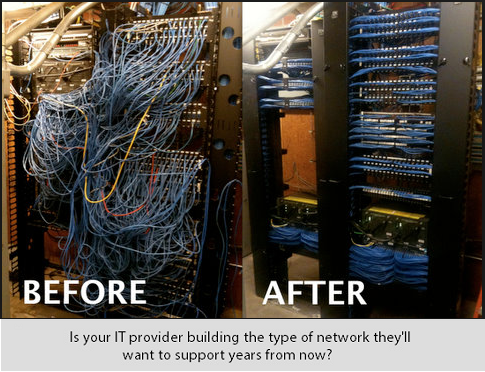Sometimes, it’s easy to tell if your IT provider isn’t serving your needs. A major data loss can’t be recovered even though you’re paying for backups; a hardware failure reveals that there’s no backup plan for major network infrastructure; nobody at the IT provider can explain why decisions are being made.
Sometimes it’s not as easy. Maybe your company has had more network issues than usual – is it normal variation, or is your managed service provider falling down on the job? Rather than focus on individual issues, it helps to take a more holistic view of your relationship. Towards that end, here are three ways to know that it’s time to consider another provider to support your technology needs.
#1 – Your provider is always two steps behind, not two steps ahead
The beginning of a new relationship may involve many reactive issues, as your provider brings your technology up-to-speed and becomes familiar with your network. After this, however, your provider should be working to reduce the number of ‘reactive’ tickets. While any network is going to have hiccups and software issues, many of them can be prevented with proactive work. Managed service providers have access to many tools to let them know about problems before they occur – software that needs patching, hard drives that are nearing failure, and dangerous emails received by your company. They should be putting these systems in place to reduce the number of problems you encounter.
These preventative maintenance systems are common in managed service provider relationships because both you and your provider lose time and money when your users encounter problems. They are less common when companies pay outsourced technicians strictly on an hourly basis, however. In these cases, network problems represent a revenue stream for IT providers, and it’s not necessarily in their best interest to eliminate them.
IT providers also fail to put preventative maintenance in place when they aren’t focused on your company’s future goals and longer-term technology needs. Experienced and informed technicians can configure hardware and software in ways that are less likely to present problems in the future, when new technology is added, or old technology is removed. This foresight is less likely if your IT provider isn’t focused on your business goals.
#2 – Your provider doesn’t understand what your business does, and they aren’t trying to learn.
Focusing on your company’s business objectives is a major investment for a managed service provider. It requires the provider to learn enough about your industry to understand how they can help you meet your business goals. As you know, there’s probably no manual describing your industry – it takes time and effort.
But it’s impossible to truly serve a company’s technology needs without understanding what they intend to do with that technology. That’s why you should question any provider that commits to serving your technology needs before they’ve asked about your industry, your company, and your business objectives.
Despite the time and expense of this investment, there’s no question that industry-level understanding benefits both the IT provider and their client over the long term. Investing in that knowledge early can save hundreds of hours of avoidable work, and re-work, over the length of the relationship. Those are hundreds of hours that your users are waiting for solutions to technology problems instead of working. Those are also hundreds of hours that aren’t being billed by the managed service provider – most of them will likely be covered by your flat monthly fee.
#3 – Your provider has a short-sighted focus and a short-sighted culture
If it’s in everyone’s best long-term interests for your managed service provider to learn about your industry, company, and business objectives, then why don’t they do it? In many cases, it’s because they aren’t focused on their long-term interests – or yours.
There are a few causes of this:
- The engineers at your managed service provider are already over-extended and do not have the time to make up-front time investments due to challenges being faced by other clients.
- The provider doesn’t have a long enough average client tenure to justify all of this up-front work, because they won’t have time to recoup the investment.
- The provider has a high enough engineer turnover that the knowledge will be lost due to employee turnover before they recoup their investment.
- The provider brings so many new clients on-board each month that it’s not worth investing in long-term relationships with the clients they already have.
How are all of these related?
If your IT provider isn’t taking the time to dive deeper than just your technology, they’re providing you with subpar IT support. You’ll know if your IT provider isn’t serving your needs if:
- They don’t care enough about your business, your users, and your growth objectives to learn much about them.
- They don’t continually find ways to improve your organization’s efficiency but instead view your company as a revenue stream.
- Their focus isn’t on how they can help you in the next year, but instead on how to justify the work they’ve done in the last year.
- They don’t measure your relationship in years of service, but instead on months of remaining contract time.
If this sounds like the relationship you have with your current IT provider, let’s talk! Call us at 919-779-0954 or contact us online.

